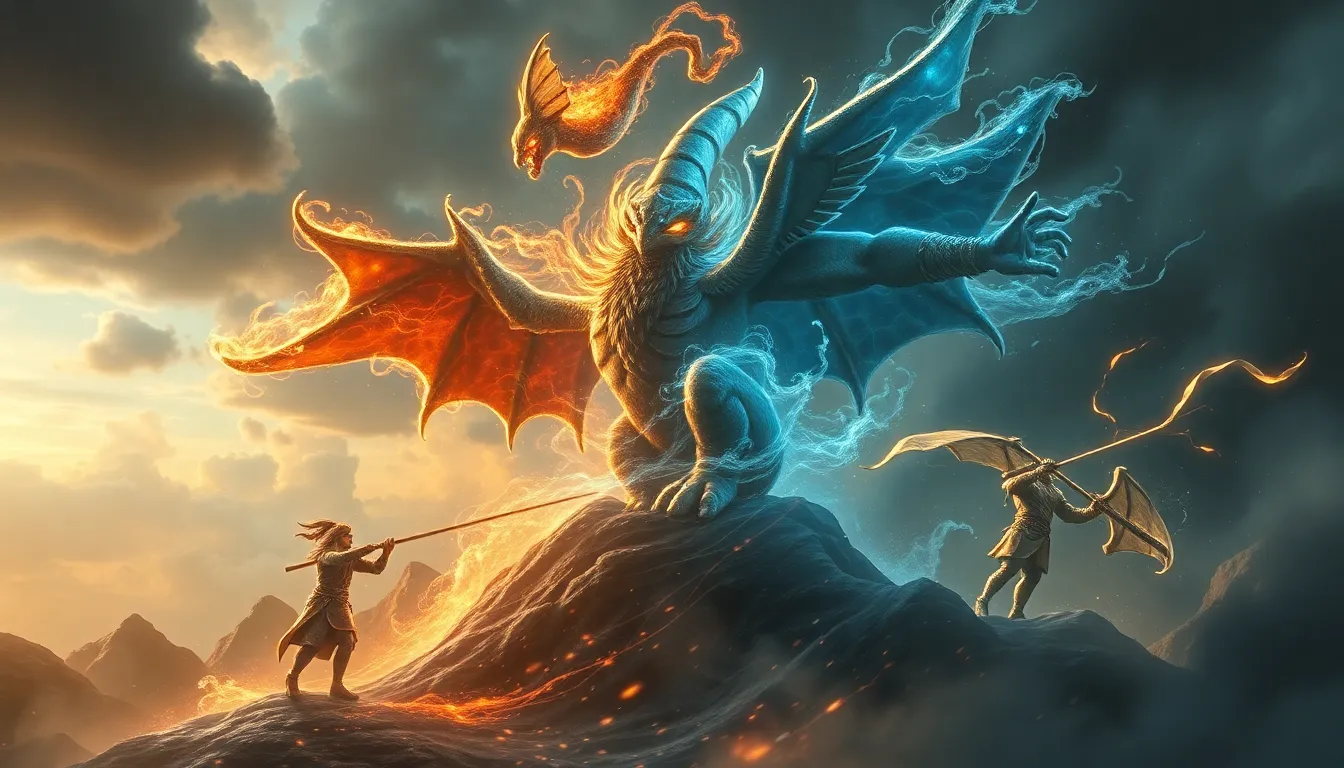Blood and Valor: The Legendary Conflicts of Myth
Introduction to Mythological Conflicts
Myths are foundational narratives that shape cultures, embodying their values, beliefs, and historical memories. They serve as a lens through which we can explore complex human experiences, particularly conflict. The concept of conflict in mythology often reflects the struggles between good and evil, order and chaos, and the hero’s internal battles.
This article delves into key legendary battles from various mythologies, exploring their symbolic meanings and the cultural significance they hold. Through an examination of mythological conflicts, we can gain insights into the human condition and the values that endure across generations.
The Role of Heroes in Mythological Battles
Heroes are central figures in mythological battles, embodying the qualities that cultures aspire to. They often possess extraordinary abilities, courage, and a sense of duty that propels them into conflict.
Key characteristics of mythological heroes include:
- Exceptional strength or intelligence
- A strong moral compass
- The ability to inspire others
- Undergoing significant personal transformation
Notable examples of mythological heroes include:
- Achilles: The mightiest Greek warrior in the Trojan War, known for his near invincibility.
- Hercules: Renowned for his strength and heroic feats, Hercules faced numerous challenges that tested his character.
- Beowulf: The hero of the Old English epic, Beowulf confronts monstrous foes to protect his people.
Each hero’s journey from the ordinary to the extraordinary is marked by conflict, where they face external enemies and internal struggles, ultimately leading to personal growth and transformation.
Gods and Goddesses: The Divine Influencers of War
In many mythologies, gods and goddesses play a crucial role in shaping human conflicts. Their divine influence often determines the outcomes of battles and the fates of heroes.
Major deities associated with war include:
- Ares: The Greek god of war, representing the chaotic and brutal aspects of conflict.
- Athena: The Greek goddess of wisdom and war, embodying strategic and just approaches to battle.
- Thor: The Norse god of thunder, known for his strength and protection of humanity against chaos.
- Odin: The all-father in Norse mythology, a complex figure associated with war, wisdom, and death.
Divine intervention is a recurring theme in mythological battles. For instance, in the Trojan War, the gods take sides, influencing the course of events based on their loyalties and rivalries.
Famous Epic Battles: A Comparative Analysis
Throughout history, certain epic battles have left a profound impact on mythology and culture. Three significant conflicts are often examined:
- The Trojan War: A ten-year siege sparked by the abduction of Helen, leading to the fall of Troy and the exploration of themes like love, betrayal, and sacrifice.
- The Titanomachy: The battle between the Titans and the Olympians, symbolizing the triumph of a new order over the old, establishing the supremacy of Zeus and the Olympian gods.
- The Battle of Ragnarok: In Norse mythology, this apocalyptic battle signifies the end of the world and the cyclical nature of life, death, and rebirth.
Each of these battles not only serves as a narrative centerpiece but also conveys deeper meanings about power, fate, and the human experience.
Symbolism of Blood and Valor in Myths
Blood and valor are powerful symbols in mythological narratives, representing sacrifice and courage. The significance of blood often ties into themes of life, death, and the connections between beings.
In many cultures, blood is associated with:
- Rituals of sacrifice, where the shedding of blood is seen as a means to appease the gods.
- Lineage and heritage, emphasizing the bonds between ancestors and descendants.
- Conflict and resolution, where bloodshed denotes the seriousness of war and the costs of victory.
Valor, as a virtue, is celebrated across cultures, often depicted as:
- Courage in facing fear and adversity.
- Selflessness in protecting others.
- Honor in upholding one’s beliefs and values.
The intertwining of blood and valor in legendary narratives highlights the profound sacrifices made by heroes and the weight of their choices in the face of conflict.
The Aftermath of Conflict: Lessons from Mythology
The consequences of legendary battles often extend beyond the immediate outcomes, shaping societies and cultures for generations. Mythological conflicts serve as cautionary tales, imparting moral and ethical lessons that remain relevant today.
Some lessons derived from these narratives include:
- The importance of unity and collaboration in overcoming challenges.
- The recognition of the consequences of pride and hubris.
- Understanding the cyclical nature of conflict and resolution.
These stories have enduring impacts on modern values, encouraging reflection on human behavior and the consequences of choices made in times of conflict.
Myth and History: The Intersection of Fact and Fiction
The line between myth and history is often blurred, as historical events frequently influence mythological narratives. Oral traditions play a significant role in preserving these legendary stories, allowing them to evolve and adapt over time.
Examples of historical figures who became mythologized include:
- Alexander the Great, whose conquests and leadership inspired legends of heroism.
- King Arthur, a historical figure whose story became steeped in mythological elements of chivalry and magic.
These transformations illustrate how history and mythology intertwine, creating rich narratives that resonate through time.
Modern Interpretations of Mythological Conflicts
Today, mythological battles continue to inspire literature, film, and art, reflecting contemporary society’s struggles and values. Modern adaptations often reinterpret these ancient conflicts to address current issues, making them relevant to new audiences.
For instance, films like “Troy” and “Thor” explore themes of honor, sacrifice, and the complexities of war through a modern lens. These adaptations allow for a dialogue between ancient and contemporary experiences, showcasing the timeless nature of myth.
Cultural Variations in Mythological Conflicts
Mythological battles can be found across cultures, including Greek, Norse, Hindu, and Native American traditions. While the themes of conflict are universal, the characters and narratives vary significantly.
Common themes across cultures include:
- The struggle between good and evil
- Heroic sacrifice for the greater good
- The role of divine beings in human affairs
Understanding these cultural variations enriches our appreciation of the universal nature of conflict in human experience.
Conclusion: The Lasting Legacy of Blood and Valor
In conclusion, the legendary conflicts of myth reveal profound truths about the human experience. The exploration of heroes, divine influences, epic battles, and the symbolism of blood and valor offers invaluable insights into our values and beliefs. As we reflect on these narratives, we recognize their lasting legacy in shaping cultures and moral frameworks throughout history.
<p



